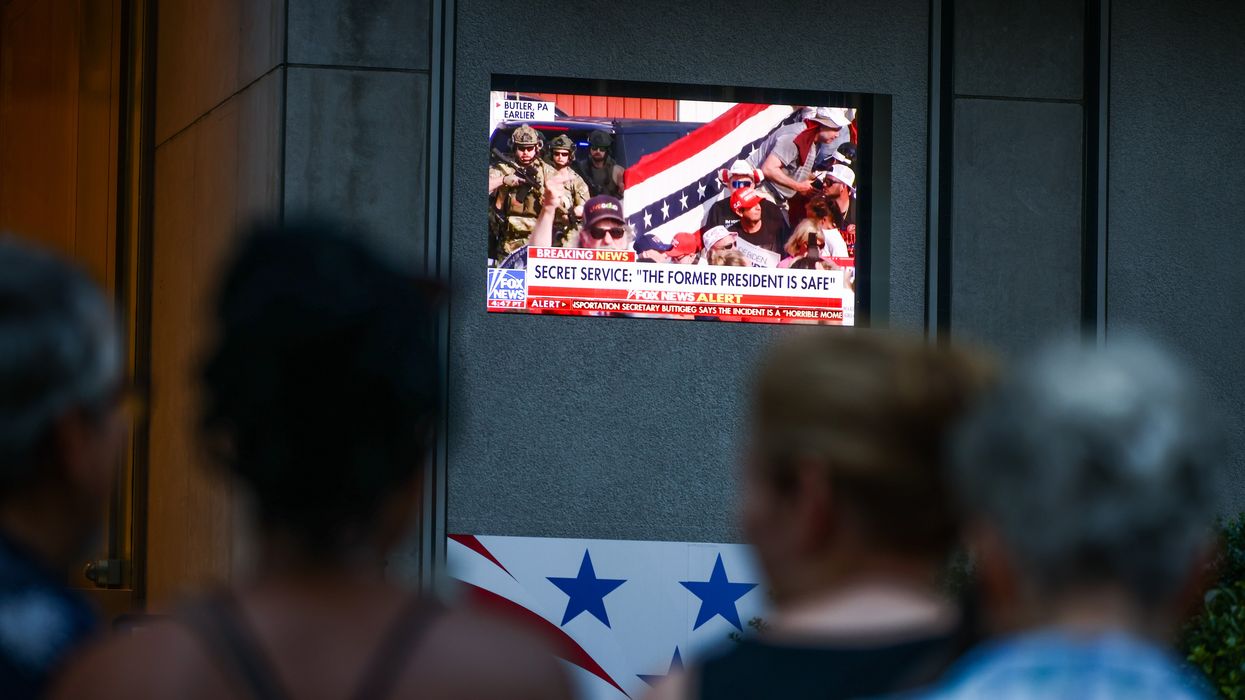Merloe is a member of the Election Reformers Network Advisory Council and provides strategic advice on democracy and elections in the U.S. and internationally.
The United States is not alone in suffering political violence — nor is the despicable attempted assassination of Donald Trump the sole such incident in modern American history. The outpouring of prayers and calls to tone down rhetoric are laudable, but they are not enough to change the current political dynamics. Succumbing to a sense of futility and disengaging from politics will only make things worse.
We need something big, loud, positive and continuous to break through political negativity. The rising tide in support of political violence must be confronted by a strong public outcry against it.
Civic, religious, sports, entertainment, business and political leaders must step up. It is time for an all-out campaign for peaceful politics in America. Concerts for peaceful politics (national, like Live Aid, and local) and support by superstars of all sports and entertainment genres and by business leaders — individually and jointly — are required, as are inter-religious messaging for peaceful politics. Which companies will include peaceful politics in their ads? Who will do TikTok posts for it? And dare we imagine even the sports internet and the Zynternet embracing peaceful politics?
And, every one of us has the responsibility to engage in such messaging in our personal and digital worlds, including editorial board members, media personalities and influencers.
Such efforts positively affected countries in Africa, the Balkans and Latin America where political violence took horrific tolls and/or was threatening peaceful democratic political processes. Building pressure for peace adds incentives for parties and candidates to moderate and call on their supporters to eschew violence.
Candidate and political party anti-violence pledges are often a focus of attention. They are most effective when included in a broader public campaign to mobilize demand for peaceful politics. Voluntary anti-violence pledges can be particularly effectual where: the pledge is sponsored by an authoritative convening body or coalition that the political antagonists find difficult to refuse; the pledge requires the candidates to make regular public calls for supporters to eschew violence; supporter training repeats the pledge; and the accord includes a monitoring body to call for accountability should political violence occur.
Ghana’s current anti-political violence initiative is led by the highly influential National Peace Council. It includes a party code of conduct against vigilantism and electoral violence, with a commission to address violations of the pledge. The NPC and others are conducting a “national peace crusade” for the December 2024 elections. Such peace campaigns played important roles in mitigating political violence in Ghana’s past elections They provide just one positive country example.
There are current examples to draw upon in this country as well, including legislative enactments such as Utah’s voluntary “pledge of fair campaign practices.” Plus, there are calls like the multi-organization effort around the Candidate Principles for Trusted Elections, co-led by The Carter Center and the Gerald R. Ford Presidential Foundation with complementary efforts by others, such as Team Democracy, which includes former U.S. military leaders. Such initiatives rightfully embrace anti-violence principles as part of broader election campaign ethics, because peaceful politics requires more than renouncing violence.
Peaceful politics extends beyond elections. It is part of a country’s political culture, which in America is trending toward greater anticipation and even acceptance of political violence. Studies show approximately 20 percent of the population see it as acceptable and approximately 60 percent do if the other party commits political violence first, which is up 20 percent from four years ago. Confronting and curtailing that tide requires demanding a shift in culture with action on numerous fronts.
A vigorous campaign for peaceful politics in America over the next several months can avert the damage to democracy and the decades of repair that politics by violence brings. It can also provide an antidote to political negativity. We will need to project its message in various forms to detoxify our political environment in the longer run.


















 A woman prepares to cast her vote on May 4, 2025 in Bucharest, Romania. The first round of voting begins in the re-run of Romania's presidential election after six months since the original ballot was cancelled due to evidence of Russian influence on the outcome. Then far-right candidate Calin Georgescu surged from less than 5% days before the vote to finish first on 23% despite declaring zero campaign spending. He was subsequently banned from standing in the re-rerun, replaced this time round by George Simion who claims to be a natural ally of Donald Trump.Getty Images, Andrei Pungovschi
A woman prepares to cast her vote on May 4, 2025 in Bucharest, Romania. The first round of voting begins in the re-run of Romania's presidential election after six months since the original ballot was cancelled due to evidence of Russian influence on the outcome. Then far-right candidate Calin Georgescu surged from less than 5% days before the vote to finish first on 23% despite declaring zero campaign spending. He was subsequently banned from standing in the re-rerun, replaced this time round by George Simion who claims to be a natural ally of Donald Trump.Getty Images, Andrei Pungovschi

Trump & Hegseth gave Mark Kelly a huge 2028 gift